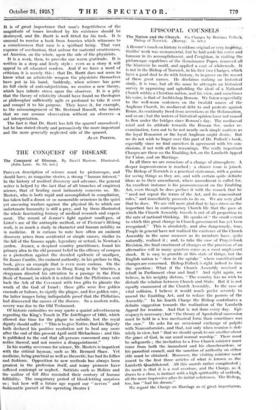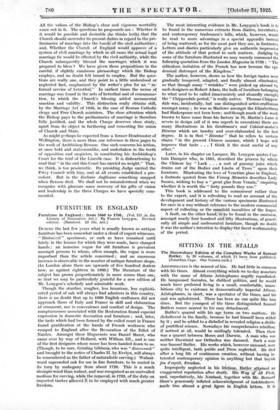EPISCOPAL COUNSELS
The Nation and the Church. Six Charges by Bertram Pollock; Bishop of Norwich. (Murray. 5s. net.) A Bisuor's touch on history isseldom original or very inspiring. StUbbs' work was monumental, bid he laid aside.his verve'and humour in its accomplishment, and Creighton. in 'visiting the picturesque sepulchres of the Renaissance Popes, removed alt the bizprrerie he could, and applied a coat of whitewash. It is not in the Bishop of Norwich, in his first two Charges, which have a good deal to do with history, to improve on the record of these great names. He disclaims making an historical study, it is true, but all the same-he attempts an historical survey in appraising and upholding the ideal of a National Church within a Christian nation, and his view, and sometimes hii voice, is that of Archbishop Benson. We listen respect fully to the well-worn sentences on the twofold source of the Anglican Church, its mediaeval debt to and protests against Rome, its continuity freed from accretions at the Reformation, and so on ; but the waters of historical opinion have not ceased to flow under the bridges since Benson's day. The mediaeval mind and its attitude towards the Roman See, under re- examination, turn out to be not nearly such simple matters as the loyal Romanist or the loyal Anglican might desire. But we do not wish to linger over this part of Dr. Pollock's book, especially since we find ourselves in agreement with his con- elusions, if not with all his reasonings. The really important Charges are those on the Enabling Act, on the Lambeth Appeal for Union, and on Marriage.
In all three we are conscious of a change of atmosphere. A deeper impressiveness is reached ; a clearer issue is joined. The Bishop of Norwich is a practical statesman, with a genius for seeing things as they are, and with certain quite definite ideas as to their amendment, where amendment is called for. An excellent instance is his pronouncement on the Enabling Act, even though he does preface it with the remark that he " need not repeat the terms of the Act, and its concomitant rules," and immediately proceeds to do so. We are very glad that he does. We are still more glad that he lays stress on the importitnt fact in contemporary Church life that the pace at which the Church Assembly travels is out of all proportion to the rate of national thinking. He speaks of " the small extent to which this great change in Church government has yet been recognized." This is absolutely, and also dangerously, true. People in general have not realized the existence of the Church Assembly in the same measure as its members have, quite naturally, realized it ; and, to take the case of Prayer-book Revision, the final enactment of changes or the provision of an alternative will in many quarters come as a most unpleasant shock. It is easy to grumble at this state of thingsf but the English nation is " slow in the uptake " where constitutional changes are concerned. Bishop Pollock is right indeed to face the question : What if the Church Assembly received a rebuff in Parliament clear and final ? And right again, we believe, in his weighty dictum, " The country has no wish to disturb the relation between Church and State. But it is not equally enamoured of the Church Assembly. In the case of Vital collision, I believe it would much prefer severely to amend the Enabling Act, and to reduce the powers of the Assembly." In his fourth Charge the Bishop contributes a definite suggestion towards the realization of the Lambeth Appeal for reunion. And that is not done every day. Epi- scopacy is necessary ; but " the theory of Apostolical succession must be held in a less mechanical form than sometimes was. the case." He asks for an occasional exchange of pulpits with Nonconformists, and that, not only when reuniorris defi- nitely in view, but " that we should speak to one another about the grace of God, in' our. usual normal worship." There must be safeguards ;. the. invitation to a Free Church, minister must Come from both the incumbent and his churchwardens, or his parochial council, and the sanction of-authority on either "'side must be obtained.' Moreover, the visiting minister must assent lo the first' three articles of what is known as the Lambeth Quadrilateral: All this sounds rather complicated its merit is that it is a real overture, and the Charge, as it draws to a close, is instinct with a high spirituality of outlook,'. all the more impressive after its initial sedateness. The Bishop, too,. has " had his dream."
We regard the Charge on Marriage as a great importance.
All the values of the Bishop's clear and vigorous mentality come out in it. The questions he propounds are : Whether it it would be possible and desirable (he thinks both) that the Church should surrender its present duties in regard to the pre- liminaries of marriage into the hands-,of the civil authorities ; and, Whether the Church of England would approve of a system of civil marriage by which in all cases the actual legal marriage tie would be effected by the civil authority, while the Church subsequently blessed the marriages which it was prepared to bless ? We have given these propositions in the careful, if slightly cumbrous phraseology which the Bishop employs, and no doubt felt bound to employ. But the ques- tions are really one, and they point to a little understood or neglected fact, emphasized by the writer's plea for an " in- formal service of betrothal" ' In earliest times the nexus of marriage was found in the acts of betrothal and of consumma- tion, to which the Church's blessing added sacramental sanction and validity. This distinction really obtains still, by the Marriage Act of 1856, in the case of Roman Catholic clergy and Free Church ministers. The close attention which the Bishop pays to the preliminaries of marriage is therefore fully justified, and the whole Charge deserves close study, apart from its object in furthering and cementing the union of Church and State.
As might perhaps be expected from a former Headmaster of Wellington, there is more than one reference in these-pages to the work of Archbishop Benson. One such concerns his action, at once bold and statesmanlike, and undertaken in the teeth of opposition and suspicion, in constituting his Archbishop's Court for the trial of the Lincoln case. It is disheartening to read that " in the end .this Court has Carried no weight" That, we think, is too pessimistic. Its presiding Judge carried the Privy Council with him, and at all events established a pre- cedent. But in the Ecclesia Anglicana something snapped when Benson died. We shall not be misunderstood when we recognize with pleasure some recovery of his gifts of vision and leadership in the three Charges we have specially com- mended.































































 Previous page
Previous page